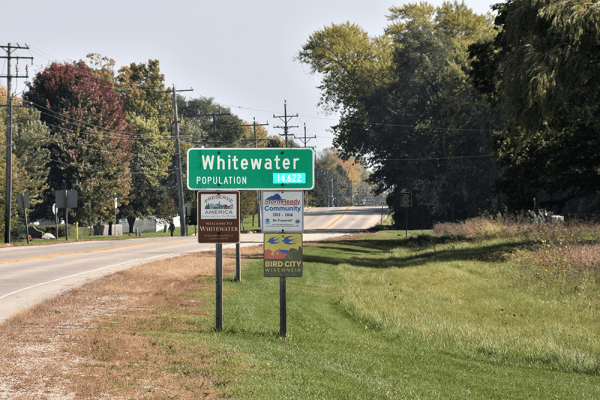This article is part of the series Faith and Migration in Swing States. New articles will be added throughout 2024 election season.
Nestled in the heart of the flat, fertile lands of southeastern Wisconsin, Whitewater is a small city of around 15,000 with a college-town feel. When Samuel Schulz, a Wisconsin Synod Lutheran pastor, moved there after graduating from seminary last year, one of the first things he noticed was a large presence of Spanish speakers around town.
“Downtown, on one street, there are three Hispanic grocery stores,” he said, “alongside a lot of Latino-owned clothing stores and restaurants.”
That revitalization of Whitewater’s main street happened hand-in-hand with what city officials estimate is the arrival of between 800 and 1,000 migrants — many from Nicaragua and Venezuela — since early 2022.
While the numbers remain modest, the condensed arrival of a concentrated group in a small city like Whitewater felt jarring to local residents, including those at Schulz’s church, St. John’s.
“There was a legitimate concern,” he said. “People weren’t sure how they could accommodate the numbers.”
Local officials, in a letter sent to President Joe Biden in December 2023, claimed the increase put a strain on the city’s public services and sought more resources to better serve the newcomers.
Schulz admitted there was some fearmongering and xenophobia at play in the city’s reaction to new arrivals, but he said first and foremost was concern about how the town could care for people, “many who don’t speak English, are unable to get a driver’s license, and don’t know the ins-and-outs of an American small town,” he said. “The main concern was how we were supposed to handle this and not be overwhelmed.”
Top issue for voters
Across the U.S., immigration is proving to be one of the most important issues in the 2024 presidential election. And despite being more than a thousand miles from the U.S.-Mexico border, it’s in Wisconsin cities like Whitewater and Green Bay, Milwaukee, and Madison, that voters of faith will head to the polls to help choose the next president and, by extension, determine potential immigration policies in the years to come.
Wisconsin, once a reliably Democratic-leaning Rust Belt state, became a battleground in the last two elections. In 2016, Trump won a narrow victory and in 2020, Biden eked out his own victory in the Badger State. In the lead up to 2024, many polls show Biden and Trump neck-and-neck in the race to secure Wisconsin’s 10 electoral votes.
Immigration is the second most important issue among Wisconsin voters according to an early April poll. Around 53 percent feel Trump would do a better job on immigration and border security; just 28 percent say the same about Biden, with 8 percent saying they would both do a good job on immigration and 11 percent saying neither would.
Wisconsinites like Schulz and his fellow Whitewater residents will also head to the polls in November with local concerns in mind. According to the Applied Population Lab at University of Wisconsin-Madison, the number of foreign-born residents in cities like Milwaukee, Madison, or Green Bay — and towns like Arcadia and Whitewater — has more than doubled in the last 25 years, accounting for 5 percent of the state’s overall population. Another 5 percent of residents are native-born U.S. citizens with at least one immigrant parent, according to the American Immigration Council. The council also found that immigrants make up a significant amount of the state’s labor force in key industries, including 15 percent of Wisconsin farmers, fishers, and foresters; immigrants also account for 13 percent of the state’s workers in computer and math sciences.
Sergio M. González, history professor at Marquette University in Milwaukee, said this means that even though Wisconsin is 1,500 miles removed from the border, it’s a real issue — both politically and as a lived experience — in towns like Whitewater.
Despite their increasing presence across the state, and importance to its economy, there has been a marked increase in the number of Wisconsin voters saying undocumented immigrants “should be required to leave the U.S.” according to Marquette University Law School polling. Four years ago, in February 2020 just 13 percent felt that way; and only 16 percent in April 2022. As of April 2024, 30 percent of Wisconsinites were in favor of making undocumented immigrants leave the country.
'A vital part of Wisconsin communities'
Rabbi Bonnie Margulis, Wisconsin Faith Voices for Justice’s current executive director, said that while she hates to commodify people, Wisconsin industries — dairy businesses, farms, factories, restaurants, grocery — would collapse without immigrant labor. Exploited, harassed, and subject to poor living conditions though they may be, Margulis said, “immigrants remain the backbone of our economy.
“As neighbors, business owners, taxpayers, and laborers,” she said, “immigrants are a vital part of Wisconsin communities, making contributions that benefit us all.”
Better economic and social conditions for immigrant laborers are important to Margulis and others who work with her at the Dane Sanctuary Coalition in Madison. But there are also other pressing concerns she said Wisconsin voters are paying attention to in local, state, and federal elections this year.
Among the Wisconsin-specific issues related to immigration are procuring in-state tuition for “Dreamers” — immigrants who have lived in the U.S. without official authorization since being brought to the country as a minor — or meeting the growing and unmet demand for immigration attorneys across the state. Also concerning for Wisconsinites, Margulis said, is the increasingly polarizing rhetoric around the situation at the U.S.-Mexico border and how it’s impacting local conversations around the issue.
Local faith leaders highlighted how politicians like U.S. Sen. Ron Johnson or U.S. Rep. Tom Tiffany are being particularly alarmist. Tiffany, who is up for reelection in fall 2024, regularly posts on social media about immigration, recently accusing some non-governmental organizations of aiding what he called, “illegal immigration.” Meanwhile, Johnson’s press releases addressing the border refer to the “unprecedented flood” of migrants or the “Biden border crisis.”
Advocating for change
This kind of rhetoric, Margulis said, stops helpful conversations before they even begin and leads to bad policy — regardless of political party. Wisconsin Faith Voices for Justice is nonpartisan and does not recommend who people should vote for, but “if you care about our immigrant siblings, you should consider what the values are of the people you are voting for,” she said.
Margulis said progressive faith campaigners like Wisconsin Faith Voices for Justice or Wisdom are also pushing for Wisconsin residents to be able to get a driver’s license regardless of status. Up until 2006, that was possible. But in anticipation of the REAL ID Act, Wisconsin’s state government made it impossible for undocumented immigrants and those without a social security number to obtain a license or any form of state identification.
As Margulis noted, this makes mundane things like driving to get to work, medical appointments, the grocery store, an immigration-related appointment, or to take their kids to school means immigrants without documentation are putting themselves at risk of attracting the attention of U.S. Immigration and Customs Enforcement.
“A broken taillight,” she said, “could be the reason someone gets detained by ICE, put into detention, or deported.” For now, faith-based organizations associated with the Dane Sanctuary Coalition — or even Schulz’s church in Whitewater — offer volunteer driving programs, to drive and accompany migrants and asylum seekers to their appointments.
A history of hospitality
Back in Whitewater, Schulz and his congregation have stepped up to do just that. Situated between three different counties, Schulz said it can be difficult for newcomers to make it to county seats for legal appointments or for medical care. “So, we are working to give people rides and accompany them to where they need to go,” he said.
And, in conjunction with local advocate Jorge Islas Martinez, St. John’s will soon be offering a program to teach English to help ease the burden on the only other program in town, which is already overfilled.
Though it’s taken his congregation some time to come around to the idea of serving in such a way, Schulz said it helped to remind them of their families’ own immigrant pasts.
“Our members are of deep, German-immigrant stock,” he said. “You read stories of people who came over from Germany with nothing, relied on the charity, kindness, and hospitality of those who had already established themselves here — and it was often at church where they found it.
“I’ve tried to make the case that out of all the people who could be helping immigrants, we should be the first ones in line,” he said.
Marquette professor González said Wisconsin has a substantial and sustained history of faith communities offering hospitality to migrants, refugees, and asylum seekers.
Although that history is far from perfect, and that hospitality sometimes limited, it continues to influence how the state’s religious institutions, communities and individuals view policy and politics today, González argues in his book Strangers No Longer.
From migrant mission chapels that respected newcomers’ cultural traditions to the radical hospitality of 1980s Sanctuary Movement in Milwaukee, González said, “the extension of hospitality represents the political, social and economic obligations a community has to those it views as new arrivals.”
But as churches and faith-based organizations continue to play a role in welcoming Latino newcomers and “navigating that relationship between forever-stranger and established neighbor,” he said in an interview, “it’s important that the people being welcomed into the space need to have a voice in shaping what that invitation, that hospitality, looks like.”
For now, Schulz said numerous local organizations in Whitewater have been working to serve newcomers through food pantries and clothing drives. In the future, he hopes, they will be able to do more.
As far as how elections might go later this year, Schulz said he’s not sure. “It’s a complex issue for the people of Whitewater and Wisconsin — one that requires a lot of patience, relationship building and asking simple questions like, ‘What do people need?’” he said.
“I probably don’t know as much as I should about the politics of immigration,” Schulz said, “but I don’t think the answer is to get so caught up in those politics that we do not serve our neighbor.”
Got something to say about what you're reading? We value your feedback!

